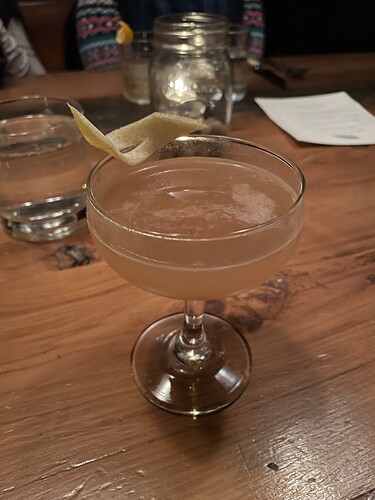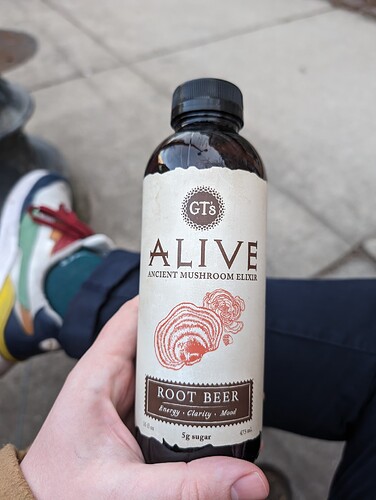I don’t have that great of a mug/glassware collection. At some point in the next couple years, I’ll intentionally get some new stuff. But I need to install some hooks for the mugs, and I need to install a bar fridge for chilled glassware.
We are going to Antler Kitchen & Bar tonight because it’s one of our favourite restaurants in the city and we are celebrating the birthdays of my Brother, his partner and my partner. Here is the cocktail list:
-
BARREL AGED VIEUX CARRÉ (2.5oz) Courvoisier VS Cognac, Lot 40 Rye, Casa Mario l Black Vermut, Bénédictine, Coffee & Pecan Bitters
-
BERRY DAZE (2.5oz) Signal Hill Whisky, Aperol, Amaro Averna, Lemon Juice, Haskap Berry Gastrique & Mint Bitters
-
CEDAR SOUR (2.25oz) Antler’s Cedar Gin, Lemon Juice, Simple Syrup & Egg White
-
DUCK A L’ORANGE (2oz) Duck Fat Washed Wild Turkey Bourbon, Curaçao Orange, Spiced Maple Syrup & Orange Bitters
-
EARL OF MONTENEGRO (1.75oz)
Malfy Gin, Tanqueray Gin, Amaro Montenegro, Earl Grey Syrup, Orgeat Syrup & Lemon Juice -
PAW PAW COLADA (2oz) Paw Paw, Plantation Rum, Strega, Basil Liqueur, Simple Syrup, Lime Juice, Coconut Milk & Rum Spritz
-
PEAR PRESSURE (1.5oz) Charred Pear Infused True Theory Vodka, Tio Pepe Sherry, Honey & Rosemary Syrup & Lemon Juice
-
RETURN OF THE SUMAC (2oz) Cazadores Blanco, Mezcal Agua Santa, Cynar, Sumac Syrup, Sumac Salt Rim & Lemon Juice
-
SMOKE BARREL (2oz) Monkey Shoulder Scotch Whisky, Maple, Chocolate Bitters & Cinnamon Smoke
-
THERE’S ALWAYS AMARO (1.5oz) Hendrick’s Gin, Amaro Nonino, St. Germain, Lemon Juice & Muddled Olive
I’d get a Pear Pressure and never look back!*
*Except to order my second drink later which would be a Duck A L’Orange
We tried most of the the last time five of us were there by trying each other’s choices. Pear Pressure is really tasty, as is Duck A L’Orange.
There’s a place not far from Antler called Project Gigglewater. Last time I was there I had this:
PHỞ’ GET ABOUT IT
PHỞ INFUSED RUM • CILANTRO & BASIL • RICE MILK • LIME
It was quite good. I was less enthused with this:
PROJECT ALLA VODKA
VODKA • PASTIS • TOMATO • LEMON • PENNE SAUCE SYRUP • DAIRY (FOR CLARIFICATION)
Lastly I tried this which was excellent:
JULES NO. 1
DRY VERMOUTH • FINO SHERRY • RASPBERRY • OAT ORGEAT • LEMON • ORANGE BITTERS
How you like it?
It’s quite good. It was actually my brother’s drink. I had a saison followed by a Cab-Franc with my meal.
i mean he actually looks strikingly similar to his old ‘guy in a suit in 8 bit’ picture
I’m assuming that apostrophe placement is intentional and you’re saying my old profile pic and not that I am an old guy
It does taste like a healthy root beer and not like mushroom juice, but I don’t know if I’m going to do this to myself again.
I haven’t tried that, but I’ve tried Kombucha concoctions multiple times over the years, and they still hold the top spot of being the possible “healthiest” yet most disgusting things I’ve ever drank.
Kombucha is a taste I have acquired but I am always aware of its relative healthiness
I’m genuinely curious about the science behind the claims of its benefits. Per Kombucha: a systematic review of the empirical evidence of human health benefit Kapp and Sumner indicate that many of the claims of its benefits are related to studies in animals, but insufficient human clinical trials have been conducted to support the claims of the industry. That’s not to say that Kombucha isn’t beneficial, it’s just to say that the jury is out and the industry is riding a wave of slightly irrelevant information given the parameters of all existing research. Kapp and Sumner say,
Our literature search identified no controlled studies of human subjects, only one study [51], [53] examining any health benefits of kombucha from human subjects research and no studies in the 15 years since Ernst’s [18] review. Nonetheless, significant commercial shelf space is now dedicated to kombucha products, and there is widespread belief that the products promote health [8].
The human health benefits of kombucha need to be tested in clinical trials [6]. Several reviews [1], [2], [6], [7], [8], [9], [10] describe potential health benefits of kombucha that warrant testing. Also warranted is replication of kombucha’s health benefits on blood sugar and hypertension [51], [53] in a controlled study. This would add to the emerging scientific movement investigating the role of the microbiome on health [15], [16], [17]; the NIH human microbiome project investigators published over 650 scientific articles by the end of 2017 [69]. Other fermented foods, including fermented milk [34] and other probiotics [6] are being studied in humans. Fermented milk is shown to prevent diet-induced insulin resistance in humans [70]. Clinical trials should address health topics for which observational or animal studies suggest benefit to answer the question: Does kombucha improve health or health-related outcomes in humans?
If kombucha has health benefits, important subsequent studies will need to address the following: At what dosage, frequency, and duration? In what populations and subpopulations? To facilitate comparison across studies, a standardized process flow is recommended for brewing [66]; other considerations include the role of the weather, geographic location, and medium on the brewing process.
Finally, mechanisms to explain human health outcomes will need to be studied. How might kombucha improve health or health-related outcomes in humans? The exact microbial composition of kombucha varies [1], [39], the underlying mechanisms of action are not well understood [39], and SCOBY biology and byproducts are complex and dynamic mixtures [39].
Kapp and Sumner do indicate that based on the currently available information in peer reviewed studies that there are some health risks associated with consuming Kombucha, but that it is safe in limited quantities for individuals without pre-existing conditions:
[K]ombucha is not considered harmful if about 4 oz per day is consumed by healthy individuals; potential risks are associated with a low pH brew leaching heavy metals from containers, excessive consumption of highly acidic kombucha, or consumption by individuals with pre-existing health conditions [26], [66]. Proper brewing methods are described in detail [66].
Wow never knew that made drinks like this
I’m starting to think @BMO is anti-techbro lifestyles ![]()
Or, in other words, based?
This kind of reminds me how most of the omega-3 benefits are based on studies on inuit diet: Fool’s gold: what fish oil is doing to our health and the planet | Health & wellbeing | The Guardian
Im old and don’t know if based is good or bad. I was mostly just teasing. There was some stuff on here about intermittent fasting a couple weeks ago. Fasting and kombucha/fermented foods attracts the same crowd (me I guess).
It’s interesting, that article doesn’t once mention the ratio omega-6 to omega-3 fatty acids in our diets. I do take a fish oil supplement in the morning, although I don’t take it for heart health. I generally take it because I do feel an inflammatory difference. I feel way more sore when working out if I don’t take it. Could be a placebo, but it works for me.
I am just basing this off of memory from listening to podcasts, but I always thought that the important part of omega-3s for heart health was just the ratio of omega-6 to omega-3. Generally a western diet these days is like 20 to 1, 6 to 3. People who are closer to 4 to 1 have way less heart issues than the 20 to 1 crowd. It doesn’t necessarily have anything to do with supplements though, it’s generally just diet differences. People in that 4 to 1 crowd are probably eating way more fish than McDonalds.
Basically I’m just agreeing with that article that fish oil isn’t a magic cure for autoimmune and cardiovascular issues. Cutting back on the other shitty foods that the world feeds us works a lot better.
I just want everyone to know I just saw my doctor and he diagnosed me as immortal!!!

